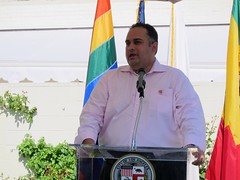Budget Based on Compromises Leaves Questions
by Brian Leubitz
First, let’s get this out of the way: the budget ($156bn for those counting at home) has now been passed and just awaits a few formalities. It is a budget of compromises, but a solid foundation for California’s priorities. And there are no big public fights, no big accusations, and no sleepovers in Sacramento. This is all good, and says a lot about the improved process under the majority vote budget system. (And Prop 30, which gives the revenue breathing room that we need.)
All that being said, the Governor wanted to maintain a hard line on spending. It’s nice and prudent and all that, but there are a lot of gaping holes in the budget that should have been addressed. George Skelton’s review of the completed product outlines some of those holes:
But the governor refused to reverse a 10% cut in pay rates for doctors who treat patients in the Medi-Cal program that is greatly expanding under Obamacare. Because of the measly rates – lowest in the nation – more and more doctors are refusing to accept Medi-Cal patients.
And, shamefully, no one even tried to restore previously cut funding for the most vulnerable: the aged, blind and disabled poor living entirely off federal and state subsistence programs (SSI/SSP) – $880 (sic, it is actually $877.40 – BL) monthly for singles and $1,480 for couples. There are roughly 1.5 million Californians receiving SSI/SSP, which was reduced to the federal minimum during the recession. The state is still stiffing them. They’re not unionized and can’t make campaign contributions. Meanwhile, legislators keep raising the minimum wage, bumping up inflation and squeezing these impoverished folks even more.
So the governor and Democrats shouldn’t be patting themselves on the backs all that much for their budget compromise. ([George Skelton / LATimes)
There have been a few good editorials about the Medi-Cal question, including this one in the SF Chronicle. Boiling it down, our reimbursement rates are among the lowest in the nation. And while there is a sharp need to control medical costs. As you can see from the graph in this tweet, our costs are still out of control. But the problem here is that if the tightest controls are isolated to Medi-Cal, doctors simply won’t take Medi-Cal patients. And that is exactly what is happening. As you can see from the ad up top, this was a big deal for the state. But under the current budget, reimbursement rates are still far too low.
In addition to the heartbreaking failure to restore SSI/SSP funding for some of the state’s most vulnerable, the state’s contributions to CalSTRS are taking a big chunk out of the restoration of funding to K12 education. And even with the $250+ million for both early child education and vocational education, there are still big funding problems at all levels of California education.
The other big issue: yeah, that would be Republican Majority Whip Kevin McCarthy’s non-stop tirade over the high speed rail project. (Seen here looking hilarious in flick user donkeyhotey’s cartoon.) The budget allocates $250m from cap and trade revenue, but long-term funding issues are still out there. At this point, HSR leaders can point to several billion of funding that is out there for the project, but are still a ways off from the full price tag. And if McCarthy becomes Majority Leader as expected, comments like these could mean it becomes a lot more challenging to get federal assistance for the project:
“Governor Brown’s persistence shows he is more interested in protecting his legacy than communities that will be uprooted by its intrusion,” he added. “As long as I am in Congress, I will do whatever I can to ensure that not one dollar of federal funds is directed to this project.” (Melanie Mason / LAT)
But those decisions are for another day. Today, we have a budget that will keep the lights on throughout the state, and that’s good thing.





